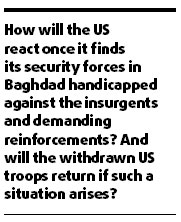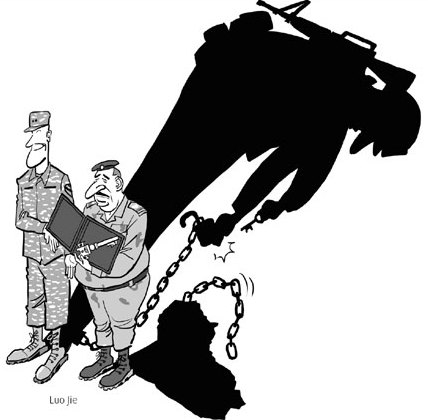The good and bad of US pullout
American troops began withdrawing from Iraq's urban areas yesterday, six years after the invasion, having handed over security duties to Iraqi forces. The decision to pull out American troops from Iraqi cities and towns is President Barack Obama's defining step toward ending the US' combat role in Iraq and complete withdrawal of its forces by December 31, 2011.
The US has been embroiled in controversy ever since it invaded Iraq, with the pressure to pull out troops increasing with every American soldier's death. Obama's decision to pull out troops will end the US' controversial war and prevent the death of more American troops.

But the withdrawal process raises some questions. What has the Iraq war helped the US achieve? What has the US' six-year military presence brought to Iraq?
The war that former US president George W. Bush launched in 2003 ousted Saddam Hussein and saw him hanged for his "crimes". But it has not ended anti-US insurgency and, more importantly, failed to bring peace to Iraq, as the Bush administration had promised.
With the US' main strategic goals unresolved, the incumbent US administration will find it hard to explain the Iraq war to Americans.
The withdrawal of US troops from urban areas could embolden anti-US forces in Iraq to intensify their attacks against American soldiers that will continue to patrol rural areas. And history shows they will not let such a chance slip by.
So how will US troops respond if attacks against them increase after their colleagues pull out from urban areas? Since any overreaction can affect their withdrawal process, they have to consider all countermeasures.
According to the plan reached with the Iraqi administration, the US will first withdraw its combat troops, while a certain number of its security forces will remain in Iraq. But that could make the remaining US troops vulnerable.
How will the US react once it finds its security forces in Baghdad handicapped against the insurgents and demanding reinforcements? And will the withdrawn US troops return if such a situation arises? This possibility cannot be ruled out unless the US pulls out all its forces from Iraq.
For Iraq, the withdrawal of US troops signals a major victory in its effort to realize national sovereignty. The US pulling out of combat troops from urban areas means a significant step toward ending foreign military presence in Iraq, Iraqi Prime Minister Nouri al-Maliki said at a memorial service recently.

To celebrate the US troops withdrawal, the Iraqi government declared June 30 a "public holiday", eliciting a sense of pride in getting back the reins of security in at least part of the country.
The other good thing about the US troop withdrawal is that it could prompt some Al-Qaida groups to leave Iraq, mitigating to some extent the security pressure on the government.
But the US troop withdrawal could leave Iraq with some problems and uncertainties, too. For example, Iraqi security forces have to maintain security and social order. Iraq has a 750,000 security personnel, but not the combat capability of US troops. And if the much better trained US troops couldn't wipe out insurgency in Iraq, can the Iraqi forces do so?
Bombings and suicide attacks have increased since the beginning of this year, but only some of them have been targeted at US troops. Most of them have targeted the Iraqi government and people. This raises the fear that once the US troops withdraw the insurgents' war against the US could turn into a civil war, especially between Shi'ites and Sunnis.
In the absence of US troops and a highly capable security force in Iraq, there is fear that the radical armed wings of the two religious factions could declare war against each other to get as much power and privileges as possible in the new dispensation.
In fact, almost every domestic conflict in Iraq has the potential of snowballing into a deeper crisis, and spreading to neighboring countries.
Iraq fought an 8-year-long war with Iran. Just a couple of years after the end of that war, Iraq invaded Kuwait, leading to the Gulf War in 1991. Even after the war, Iraq has had many disputes with Iran, especially over Islam. The US military presence ensured that the two countries did not clash over sectarian beliefs. But if the Shi'ite-Sunni conflict in Iraq is not controlled after the US withdraws its troops, it could escalate into a conflict with Iran.
The author is a researcher with the China Council for National Security Policy Studies.
(China Daily 07/01/2009 page9)














